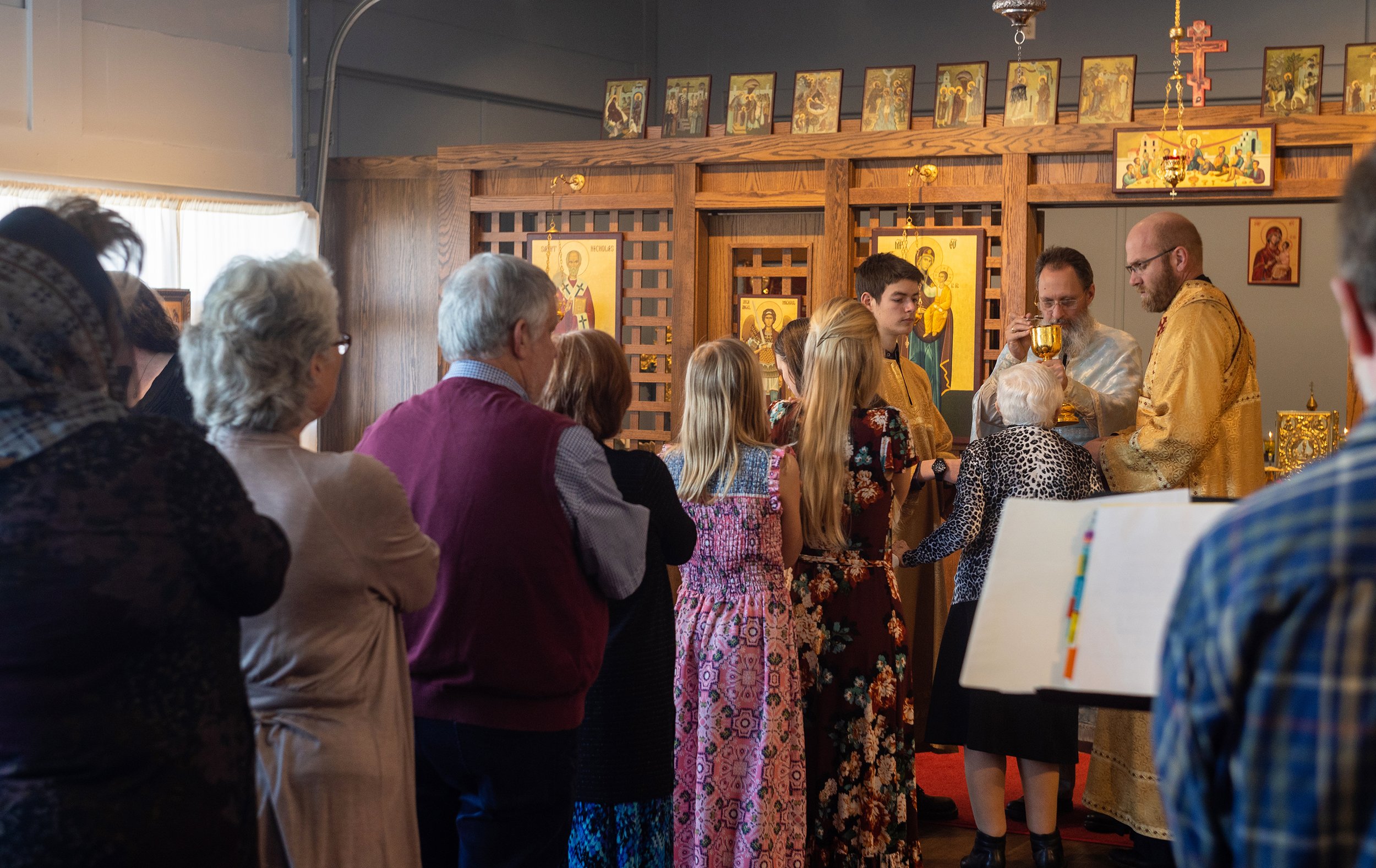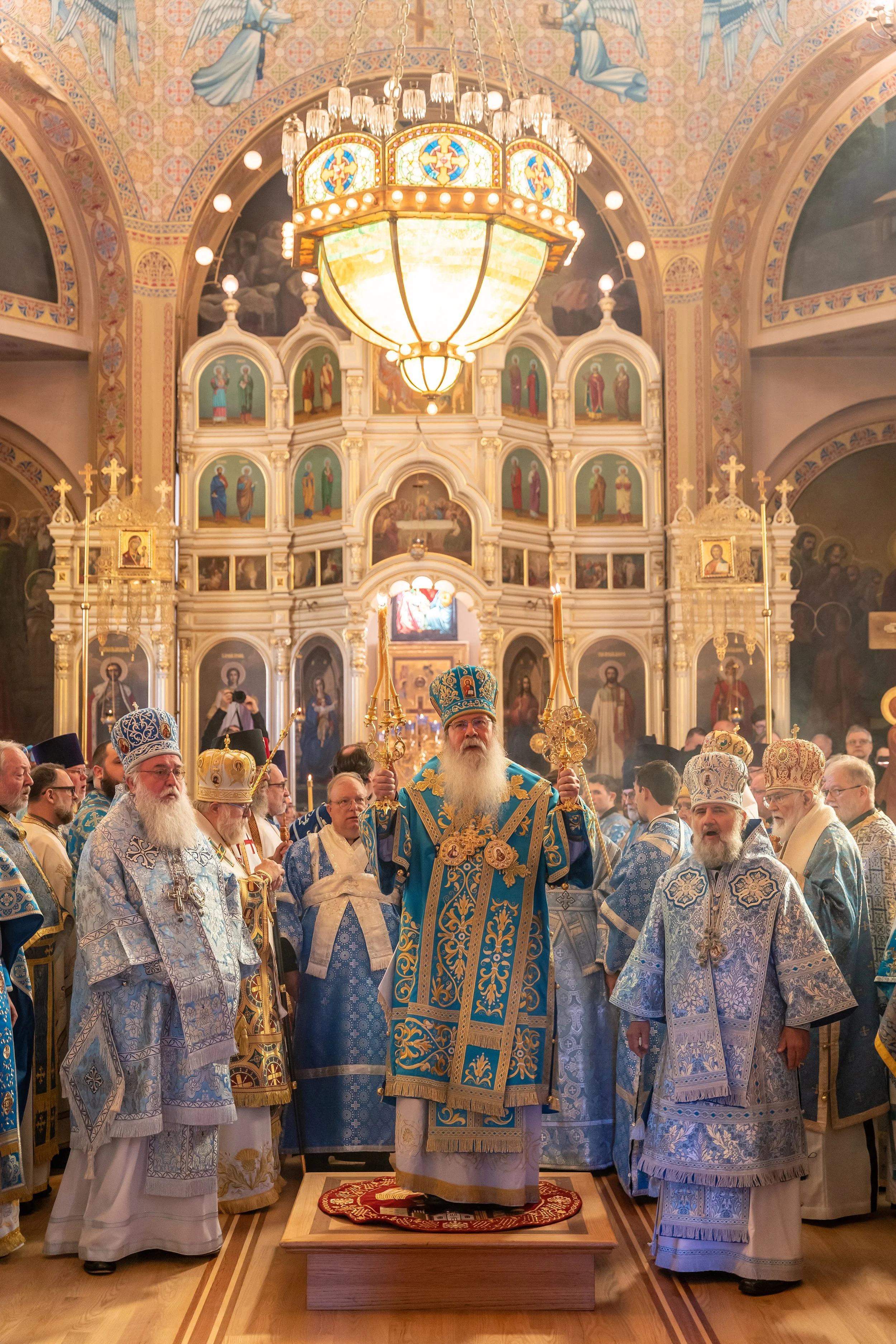
Orthodox Christianity
The historical Church founded by Christ and the Apostles
"The Orthodox Church is evangelical, but not Protestant.
It is orthodox, but not Jewish.
It is catholic, but not Roman.
It isn't non-denominational - it is pre-denominational.
It has believed, taught, preserved, defended and died
for the Faith of the Apostles
since the Day of Pentecost 2000 years ago."
--Steve Robinson
"Icons...are to be kept in churches and honored with the same relative veneration as is shown to other material symbols, such as the 'precious and life-giving Cross' and the Book of the Gospels."
-The seventh and last Ecumenical Council (AD 787).
Historical Relation to Western Christianity
The Orthodox Church shares a common history with Western Christianity for roughly the first 1,000 years of the Christian experience. However, during the Middle Ages, developments in the West led the Latin Church to drift away from the Church in the East. Some fundamental and previously shared understandings were lost. For example, the authority of local hierarchs was largely supplanted by the universal claims of the Roman papacy. Also, the Nicene-Constantinopolitan Creed -- used since the early 4th Century throughout Christianity -- was unilaterally changed in the West to say that the Holy Spirit "proceeds from the Father and the son" (contrast John 15:26, "...I shall send to you from the Father, the Spirit of truth who proceeds from the Father, He will bear witness..."). These and other changes in the Roman Church led it to an increasing sense of alienation, culminating in its breaking away from the Eastern Church in 1054 AD, severing itself from communion with the rest of Christianity, leading down the path of unique development even until today. As a result, the Orthodox Christian Church is commonly understood as the normative and historic "Church of the East"-- of Biblically significant places such as Jerusalem and Palestine, Antioch, Corinth, Thessalonika, in addition to most of the southern and eastern Slavic lands, etc. However, Orthodoxy is not bound intrinsically to any historical territory.
Missionary Tradition
The Orthodox Church has a strong tradition of missionary evangelism. Unlike certain missionary endeavors by western-minded Christians, the Orthodox missionary tradition does not include attempting to impose or promote the specific culture of the missionaries because "God shows no partiality. But in every nation whoever fears Him and works righteousness is accepted by Him" (Acts 10:34-35). Orthodoxy affirms and utilizes the local language in worship and prayer. Orthodoxy enters into the culture, embracing all those aspects of a culture that are compatible with the Gospel, thereby "baptizing" the culture with its citizens.
In this way, Orthodoxy was first established in North America-- through the independent missionary activity of pioneering Russian fur traders in Imperial Alaska. Their early effort was rapidly followed by an official mission sponsored by the Russian Orthodox Church. That mission, through the activity of the humble lay-monk, St. Herman, led to the conversion of thousands of Aleuts, Eskimo, Tlingit, and other indigenous peoples of Alaska and the Pacific Northwest.
Another significant, and more recent, point in American Orthodox history was in 1987, when several former leaders of Campus Crusade for Christ, after each completed independent searches for the original Christian Church, joined together in choosing to enter the Orthodox Church, understanding it to be the original, Biblical Church. (See Becoming Orthodox.)
Tradition of Worship
Orthodox doctrine and tradition are harmoniously held together as mutually supportive parts of the single whole of Christian Truth (see 2 Thess. 2:15). Orthodoxy, which has never undergone a Reformation, sees no conflict between Scripture and Tradition, between hierarchy and laity, between local custom and universal commonality. Orthodoxy also sees no conflict between personal piety and corporate worship. Our worship is liturgical and fasting is a fundamental part of Orthodox piety, both of which were prominent in the early Church. (See Acts 13:2 where they were fasting and where the Greek original -- leitourgountōn, from leitourgeō -- literally says that they were engaging in liturgy. The same word is used frequently in Exodus, Numbers, and elsewhere in the Greek Old Testament "Septuagint" where priestly-Levitical ritual worship is discussed.) Visit us to witness the worship of the ancient Church as it has been passed down through the ages.
For a multi-confessionally administered website covering the history of worship from ancient Jewish, to the time of Christ, up through modern Protestantism and dealing with both western and eastern Christian worship traditions, visit Liturgica.com.
Metropolitan Tikhon, Primate of the Orthodox Church in America (OCA), with clergy from the Diocese of the Midwest in Holy Trinity Cathedral, Chicago, IL
One Church
In Orthodoxy, there are no denominations. The Church is a single Body, with Christ as the head (Eph. 4:11-16, etc.). The Church administration, however, is managed locally, by self-governing Churches such as the Russian Orthodox Church, the Greek Orthodox, or the Antiochian. These various Orthodox Church jurisdictions share the same faith, doctrines, scriptures, canons (guidelines), sacraments, and mutual recognition of clergy and laity. No self-governing Church can exercise authority over any of its peers or unilaterally involve itself in the other's local activities (compare Rom. 15:29).
There is, it should be noted, an order of honor accorded to the various national churches, with the “Patriarch of Constantinople” (Istanbul) being recognized as first among equals and having the right to convene and chair synods of his peers.(This is not analogous to the role of the Roman Pope in Roman Catholicism.)
In short, the Orthodox Church is not bound by any historic period, language or culture. It is the Body of Christ constituted by the Holy Spirit; it is the Church of the Apostles (1 Cor. 12:13; Gal 3:28; Col. 3:11; Heb. 13:8).
Communion
In this day and age of ecumenical dialog and interdenominational communion, we ought to consider some things about the Orthodox understanding of Communion.
The Orthodox policy on communion could be called "closed" and in this we could be described as even more strict that the Roman Catholic Church. However, our understanding of Communion is not really that it is closed. All are welcome to the chalice, but... (And here's where a quick question leads to a not-so-quick answer.)
Our understanding is that Sacramental, Eucharistic Communion is an act of union born of our already-established communion within the undivided Church. On a personal level, sacramentally communing means that in all aspects of faith, we are of one mind: we all speak the same thing, there are no divisions among us, and we are perfectly joined together in the same mind and in the same judgment (1 Cor. 1:10). We each are making the statement that "I share the total faith of the undivided Orthodox Church -- there is no other Church for me and there is no other faith for me."
This is demonstrated in our baptismal liturgy when the first one to receive holy Communion from the priest is the one who was just received into the Church through baptism and chrismation (roughly akin to confirmation). This receiving of Communion is a public statement that this faith, this Church, is my faith, my Church.
In other words, we view Communion not as the path to, nor a means within, but as the fruit of, our singular acceptance of the Orthodox Christian faith and Church.
As for the historical, Old Covenant, backdrop to this New Covenant Sacrament, we confess Jesus as the new and holy, mystical Passover (1 Cor. 5:7). From the beginning, this confession has always led the Church to share this Sacrificial Lamb only within the undivided Church, just as in the Old Covenant, the Lord had commanded that only official members of the congregation of Israel were allowed to eat the Passover. Neither the sojourner, the hired servant, nor even the live-in servant could eat it, unless and until they abandoned their previous faith and formally were made to be members of the congregation of Israel through circumcision (Exo. 12:43-48).
In a similar vein, Saint Paul then takes it for granted that there ought not be divisions within the Lord's Supper (1 Cor. 11:18-20) because just as Christ is undivided, so also His Body, the Church, is undivided (1 Cor. 1:11-13).
Thus, from the Scriptural perspective, the Orthodox understanding is that we may not offer communion to those from whom we are divided: Those who confess any other creed, those who are not members of the Orthodox Christian Church. In so doing, the Church maintains its fidelity to Christ, in part, by sharing the Sacrament only with persons who are members of the undivided Orthodox Church. Recognizing the reality of divisions among our fellow Christians, however, at almost every service, we pray "for the union of all" and in the ancient liturgy of St. Basil the Great, we explicitly ask the Lord to "reunite the separated."
One last essential point that needs to be mentioned is that we believe that Christ spoke truthfully when He said, "Take eat, this is My body" (Matt. 26:26, etc.). We do not read it as mere symbolism, for if He were speaking only metaphorically, He would not have said, "Truly, truly (literally, “Amen, amen”) I say to you, unless you eat the flesh of the Son of Man and drink His blood, you have no life in you" (John 6:53). Nor would He have said, "For My flesh truly is food, and My blood truly is drink" (John 6:55). And again, the Gospel points out that this was not euphemistic symbolism, rather it is "a hard saying" which led many of His disciples to no longer follow Him (John 6:60-66). Furthermore, St. Paul could not have claimed that many have become weak, sick, and even died from profaning a mere symbolic representation (1 Cor. 11:23-30). Just as the individual members of the Church are consecrated to constitute the Body of Christ, so too we understand the bread and wine to be His Body and Blood (1Cor. 10:16-17; 12:27).
Bishops of the OCA at the Enthronement of Bishop Daniel to the Diocese of the Midwest, Holy Trinity Cathedral, Chicago
Experience
The Orthodox faith places a great importance on experiential knowledge, rather than what may be termed as “head,” “armchair,” or theoretical knowledge. The only way to truly learn about the Orthodox faith is to experience it first hand.
If you have questions, or want more information, please contact Fr Bartholomew.
Want even more?
Check out our links page for more information on Orthodoxy and Orthodoxy in America.

“From an Orthodox Christian perspective, God has already united all things in Christ. He has already made his Son the head over all things. This is God’s plan before the foundation of the ages. It is the “mystery of Christ,” hidden from the angels and made known in the Church, which, according to apostolic testimony, is the Israel of God, Christ’s Body and Bride, the temple of the Holy Spirit, the pillar and bulwark of truth, the fullness of him who fills all in all.”*
— Fr Thomas Hopko
*See Rom 11; Gal 6; 1 Cor 3,6,12; 1 Tim 3; Eph 1,4; Rev 21.










